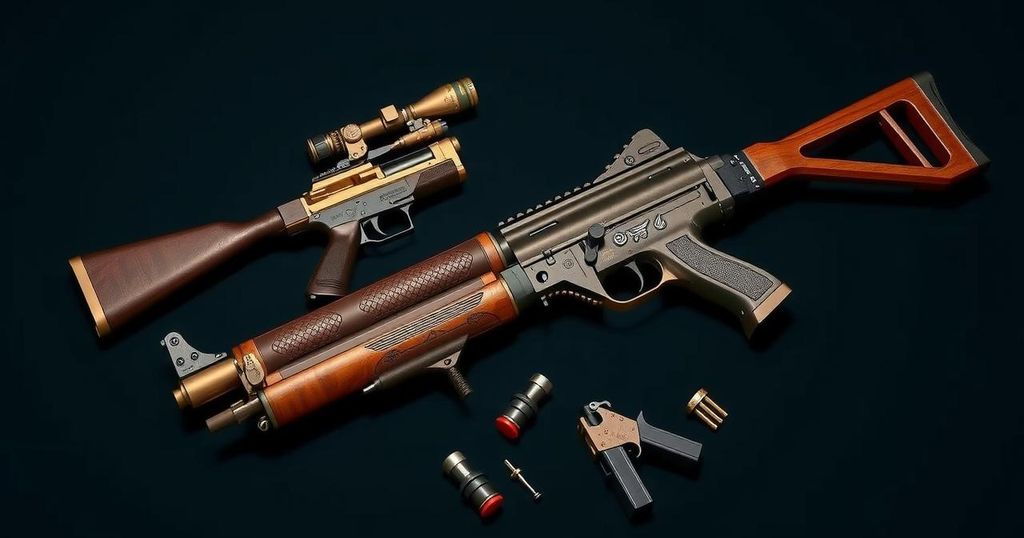Global news
Politics
AFRICA, AGNES CALLAMARD, AGNÈS CALLAMARD, AMNESTY ’, ASIA, CONFLICT RESOLUTION, DARFUR, GOVERNMENT, GUARDIAN, HUMANITARIAN CRISIS, MILITARY, PEACEKEEPING, RAPID SUPPORT FORCES, ROSEMARY DICARLO, SUDAN, SUDANESE RAPID SUPPORT FORCES, UAE, UNITED ARAB EMIRATES, WAR CRIMES
Jamal Walker
0 Comments
UAE’s French-Designed Arms Detected in Sudan Amid Civil War Crisis
Amnesty International reports that armoured vehicles produced by the UAE, incorporating French military technology, are being utilized by the Sudanese Rapid Support Forces (RSF) amid the ongoing civil war in Sudan. These actions may violate the UN arms embargo on Darfur, prompting calls for countries to cease supplying weapons. The civil war has led to significant human rights abuses and a humanitarian crisis, underscoring the need for strict enforcement of arms regulations.
Amnesty International has recently disclosed that the Sudanese Rapid Support Forces (RSF) are actively utilizing armoured carriers manufactured in the United Arab Emirates (UAE), which incorporate technology developed by French military firms, in their ongoing conflict. This revelation raises serious concerns regarding potential violations of the United Nations arms embargo on Darfur, prompting calls for immediate action from the international community to cease the flow of weapons to the warring factions in Sudan. In a report released on November 14, 2024, Amnesty International has confirmed that the armoured vehicles produced by the UAE’s Edge Group are equipped with the French-designed Galix reactive defence system, which is intended to protect against hostile threats. Documentation within the report indicates that these Nimr Ajban armoured personnel carriers (APCs) have been utilized by the RSF in altercations against the Sudanese Armed Forces (SAF) and have also been captured and destroyed by the latter. Given the tumultuous history of armed conflict in Sudan and the presence of militias such as the RSF, the deployment of these military assets in the Darfur region appears to constitute a breach of the established UN arms embargo, which prohibits the transfer of military supplies to the country. Agnès Callamard, the Secretary-General of Amnesty International, has urged the French government to terminate any further military supplies to the UAE, citing that usage of these weapons in Sudan is in violation of international arms regulations. The UAE government, however, has denied allegations of providing arms or support to the RSF. The findings presented by Amnesty International signal an urgent requirement for the coherent enforcement of arms embargoes to prevent additional violence in Sudan, which is currently embroiled in a civil war that initiated in April 2023. This conflict has reportedly resulted in the deaths of over 20,000 individuals and displaced nearly 12 million more, exacerbating a grave situation filled with human rights violations, including ethnic cleansing and sexual violence. UN officials have repeatedly emphasized the need for external actors to stop supplying weaponry, as ongoing transfers considerably heighten the level of violence and obstruct peace efforts in the region.
The ongoing civil war in Sudan, which began in April 2023, has unleashed a humanitarian crisis of monumental proportions, resulting in widespread violence and human rights abuses. At the center of the conflict are factions including the Rapid Support Forces (RSF) and the Sudanese Armed Forces (SAF), which are reportedly equipped with advanced weaponry. The United Nations has imposed an arms embargo on Sudan to mitigate the capacity for violence, specifically aimed at ending the flow of arms that could exacerbate the conflict. Amnesty International’s findings illuminate the complexities surrounding arms transfers to conflict zones and call for accountability among nations supplying military technologies and equipment.
In conclusion, the alarming discovery of UAE-manufactured armoured vehicles equipped with French military systems in the hands of the RSF in Sudan highlights a potential breach of international arms regulations and the UN embargo. As the civil conflict continues to escalate, instances of such arms transfers pose critical challenges to efforts aimed at establishing peace and stability in the region. Addressing these violations through stringent enforcement of arms embargoes and international cooperation is necessary to prevent further deterioration of the humanitarian situation in Sudan.
Original Source: www.jurist.org




Post Comment